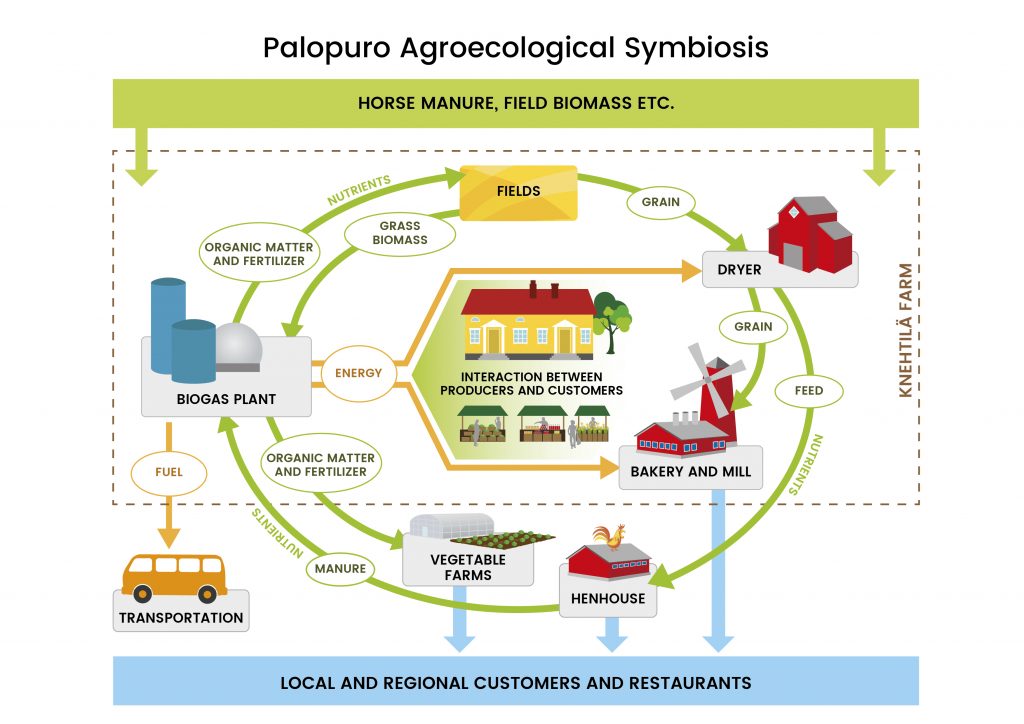Read about the AES concept here
Knehtilä Farm is at the center of a cooperative food production system based on energy and nutrient self-sufficiency. This multi-enterprise network, located in Hyvinkää, is the first of its kind in Finland. It aims to produce local, organic food using bioenergy and recycled nutrients. This cooperative will serve as a model for organic food production and processing which is truly energy and nutrient self-sufficient.
This diagram illustrates the nutrient and energy flows in the Palopuro agroecological symbiosis pilot project.
Knehtilä Farm, the winner of the 2015 environmentally friendly farm competition, has developed a network of several organic producers and processors. In the integrated system, the grain from the fields would be milled in Knehtilä, and baked to bread by Samsara, an organic bakery which has established its operations on the farm. The losses from milling and baking have the potential to be used as feed for the hens in the neighboring henhouse. They can also be utilized as energy source for the biogas production. Biomass from green manuring leys in Knehtilä’s organic crop rotation combined with the hens’ manure and manure from local horse stables would be processed by anaerobic digestion. The result would be biogas, used for grain drying, the bakery’s ovens, running the farm machinery, and local sale for passenger cars. The nutrient-rich digestion residue from biogas production, will be used as organic fertilizer and soil conditioner in the farm fields. With this system, the biomass loops are closed and the cooperative is able to operate in a sustainable manner. The aim is that this model will be reproduced by other farms around Finland. Cooperation in this manner could be the answer to a sustainable and vibrant organic sector in Finland.
The idea driving this co-operative is to locally recycle the nutrient flows generated in the production, and fully utilize the bioenergy potential in the biomass flows. This system of producing organic food considers all aspects of production and strives for maximum sustainability at every step of the production and process. By recycling the organic materials, minus the energy used for farming operations and for food processing, there is an inherent increase in soil productivity and health. This system also conserves natural resources and reduces nutrient loading to the Baltic Sea which will help to take the stress off the ecosystem.
In addition to the biophysical aspects of the system, AES creates a space for raising the social capital in the village. This village no longer has a school or a railway station, it is in a perfect position to lose its unique character, but this is not happening. The arrangement of the farms in the AES model creates a physical and mental space for the (re)connection of producers and consumers. Knehtilä Farm has opened itself as a venue for the local community to come together. The farm serves as a meeting point, an artistic and performance space, as well as retail point for locally produced, organic products. This allows for continued vitality and community connection in this small village.
The idea:
- Create an energy and nutrient self-sufficient food production system that is both locally based and transparent to the community and the consumers of the products.
- Increase economic profitability through the integration of different, but connected operations in production and processing. This integration will minimize the need to purchase inputs of energy, feeds, and fertilizers. In addition the cooperative will be making additional income by selling excess bioenergy through establish routes.
- Increase energy self-sufficiency by reducing the greenhouse gas emissions per unit of product. In addition there will be a concerted effort to increase the nutrient cycling in organic materials and processes while reducing nutrient loss to the environment.
- Strengthen the local community by reconnecting the consumers with the source of their food. This project puts consumers and producers into close proximity and allows for a transparent and understandable production process.
Location: Palopuro village, approximately 6 km south of the small rural city of Hyvinkää which is located 60 km north of Helsinki.
Projects:
Network of Agroecological symbioses 2017-2020
This project aims to scale the concept of Agroecological Symbiosis (AES) from a single site to larger scale by building a network of AES projects where local food and biogas production are integrated. Through implementation of AES it is possible to gain economic benefits on the regional level. The project partners with municipality of Mäntsälä and the local energy company Nivos Energia Oy in co-operation with Luke Natural recources institute Finland. The procjet is funded Ministry of environment’s programme to promote the recycling of nutrients and to improve the status of the Archipelago.
Download project flyer here: AES-Network flyer
Palopuro Agroecological Symbiosis Pilot Project 2015-2016
This model of production and processing of local organic food is being developed through a project called “Palopuro Agroecological Symbiosis”, which is funded by the Ministry of Environment’s RAKI programme. The project partners include the participating producers and processors together with University of Helsinki (as the responsible partner) and LUKE Natural Resources Institute Finland.
After this discreet project (2016) the project will be carried forward by local businesses and research from a biophysical and social perspective will continue from the University of Helsinki.
More information
Koppelmäki, K., Parviainen, T., Virkkunen, E., Winquist, E., Shculte, R.P.O. & Helenius. J. 2019. Ecological intensification by integrating biogas production into nutrient cycling: Modeling the case of Agroecological Symbiosis. Agricultural Systems 170. 39-48. https://doi.org/10.1016/j.agsy.2018.12.007
